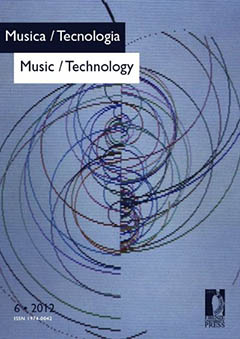 CHI SIAMO
CHI SIAMO
 ATTIVITA'
ATTIVITA'
 BANCHE DATI
BANCHE DATI
 NEWS & INFO
NEWS & INFO
- CIDIM
- Soci
- Musica in rete
- Vincitori di concorsi
- Selezioni e audizioni
- Prime assolute
- Dal vivo in Italia
- Dal vivo nel mondo
- Convegni / Incontri
- Festival e stagioni concertistiche in Italia
- Radio e televisione
- Nuove incisioni, DVD
- Libri e partiture
- Periodici
- Corsi
- Concorsi
- Formazione di base e di nuovo pubblico
- Comunicati e
Rassegna stampa - In Italia e dal mondo
- Festival e stagioni concertistiche nel mondo
 COMMUNITY
COMMUNITY
IN ITALIA E DAL MONDO
Call for papers della rivista Musica / Tecnologia
Le lingue accettate per la presentazione sono l'italiano, l'inglese e il francese. I partecipanti dovranno inviare il proprio paper in formato pdf e una breve biografia entro il 21 luglio 2024. Si prega di inviare il proprio articolo tramite il sito web: https://oajournals.fupress.net/index.php/mt/about/submissions. ___ New technological advances in electroacoustic feedback for music and composition Guest Editor: Maurilio Cacciatore contact: mauriliocacciatore@gmail.com We are pleased to announce our call for papers for the XVIII issue (2024) of Music/Technology. This issue welcomes contributions on new technological advances in electroacoustic feedback for music and composition, and their associated artistic/compositional results. The use of electroacoustic feedback nourishes the imagination of composers, sound designers, performers, software developers and luthiers since many years. The conception of electroacoustic feedback control systems and its use within mixed music, electronic performances and sound installations has created a valuable repertoire. Musical needs were supported by innovative solutions in the hardware domain and in dedicated software solutions. New musical instruments based on the use of electroacoustic feedback have been designed to broaden the possibilities of expression and performance. Multimedia projects combine the concept of feedback on several dimensions. Parallel to this artistic path, the need to prevent unwanted feedback has required the implementation of increasingly high-performance circuits and software. |







